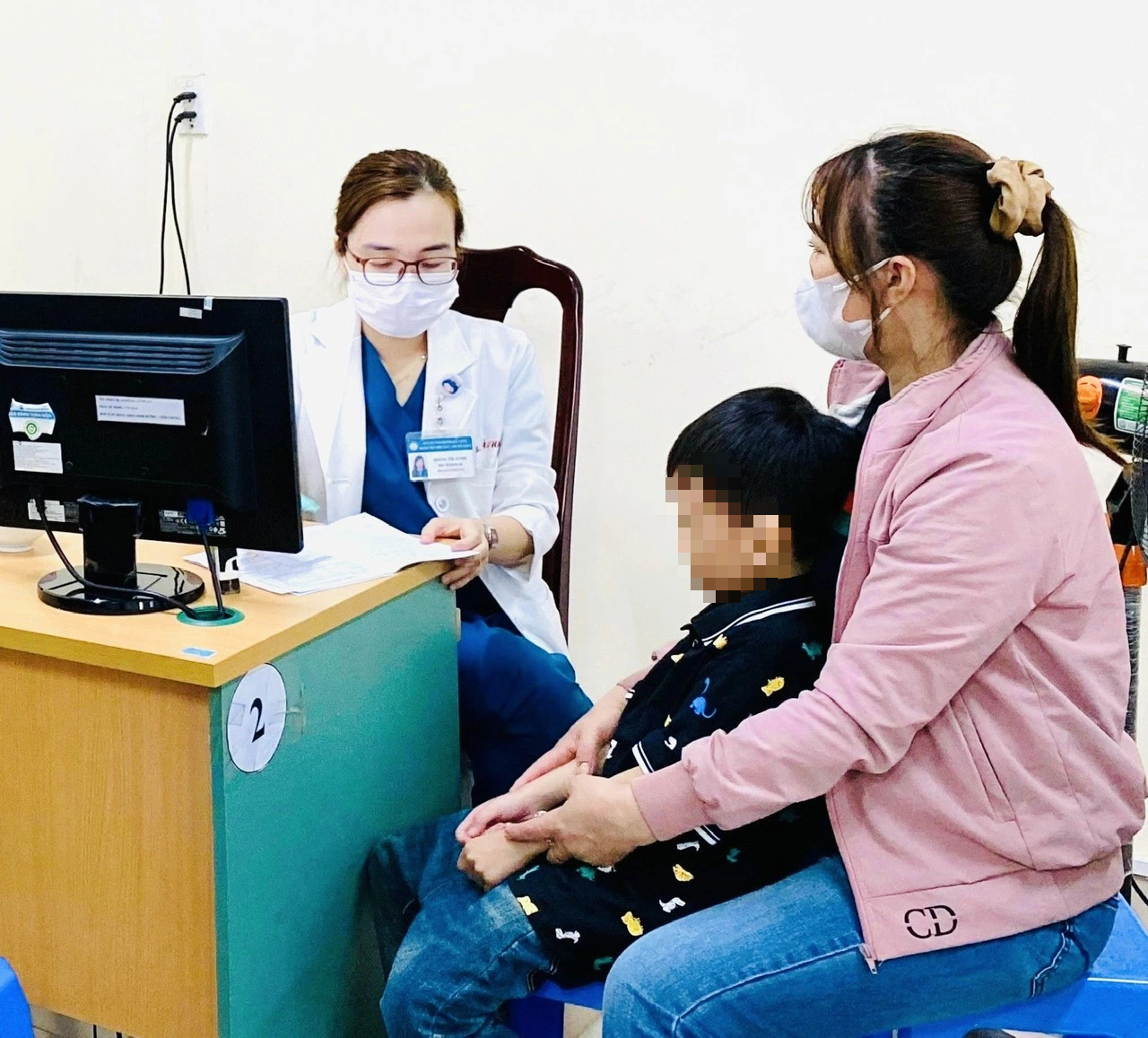Social networks are exploding with information, many types of nutritional supplements are advertised, attracting the attention of parents and many people arbitrarily give their children 'nutritional supplements' indiscriminately with the hope that it will increase their children's resistance and be good for their health.

Doctors at Da Nang Obstetrics and Pediatrics Hospital advise parents on using nutritional supplements for children - Photo: DOAN NHAN
Doctors warn that overuse of dietary supplements can lead to unpredictable consequences.
Children hospitalized for vitamin poisoning
Recently, a 6-month-old child in Hanoi was hospitalized in a state of crying, vomiting, frequent urination, and signs of severe dehydration due to vitamin D poisoning. The patient's family said that 3 months before being hospitalized, an acquaintance gave him 2 bottles of vitamin D3+K2 with similar appearance (1 bottle for adults and 1 bottle for children).
However, because I thought both bottles of vitamin D could be used for children, I gave the child the adult type. After 3 months of regularly taking vitamin D3+K2, the child developed hypercalcemia.
Dr. Thai Thien Nam, deputy head of the Department of Nephrology and Dialysis at the National Children's Hospital, said that vitamin D poisoning is a rare condition and difficult to diagnose because the symptoms are not specific. Every year, the hospital still receives a number of cases of vitamin D poisoning in children, the cause is often due to parents supplementing their children with too high a dose of vitamin D for a long time, not due to diet or exposure to sunlight.
"Parents arbitrarily giving their children an overdose of vitamin D can cause poisoning, but the symptoms of poisoning will not appear immediately, but after a few months or even a few years.
When children are poisoned by vitamin D, a lot of calcium will be deposited in their blood, leading to loss of appetite, weight loss, constipation, diarrhea, nausea, vomiting, renal tubular calcification, kidney failure...
If this condition is not detected early, the child will face serious complications, even life-threatening," Dr. Nam warned.
Who needs supplements?
MSc. Hoang Thi Ai Nhi, deputy head of the Department of Nutrition and Dietetics, Da Nang Obstetrics and Pediatrics Hospital, said that supplemented foods are regular foods supplemented with micronutrients and health-beneficial elements such as vitamins, minerals, amino acids, fatty acids, enzymes, probiotics, prebiotics and other biologically active substances. It can be understood that supplemented foods provide additional essential nutrients for the body.
Another broader concept that includes dietary supplements that many people do not distinguish is functional foods. Functional foods are used to support the functions of the human body, create a comfortable state for the body, increase resistance, and reduce the risk of disease.
Pediatricians say that dietary supplements can be produced in many forms such as tablets, capsules, powders, solutions... and can bring benefits, supplement nutrients that the body may lack or not receive enough from daily meals (anorexia, picky eating, illness, pregnant women, breastfeeding...); support to improve physical and mental health, prevent diseases...
Pediatricians recommend four main groups to use these products.
The first is sick people, people who have just recovered from illness and are recovering; People with poor diets, diets, vegetarians, and traditional/regional diets that do not ensure adequate nutrition; People who are working and studying at high intensity, overexerting themselves, and traveling to many places; Pregnant and breastfeeding women who need to supplement many types of nutrients so that the fetus can develop best.
"Food supplements do not replace medicine, they only support health in addition to daily diet. It is important to note that natural foods and a scientific diet with adequate nutrition are always the top recommendations. Long-term abuse of food supplements can lead to side effects that affect the body's long-term health," said Dr. Nhi.
Doctors also note that using dietary supplements that are widely advertised and sold on the market, with unknown origins, can lead to serious health consequences.
"Parents should care for and feed their children with a healthy, varied and rich diet to limit malnutrition in children. Before deciding to supplement any type of food for children, it is necessary to consult and have a doctor's prescription," Dr. Nhi recommends.
Dr. Nguyen Tien Dung, former head of the pediatrics department at Bach Mai Hospital, also said that in reality, many parents still think that supplements can be given to children to increase their resistance and improve their health. However, the abuse of supplements can lead to unpredictable consequences.
"A lack of vitamins and minerals is not good for your health, but an excess is equally dangerous. Therefore, when using supplements, vitamins... you should always consult a pediatrician," said Dr. Dung. At the same time, he recommended that vitamin supplements cannot replace food, but you still have to eat a full, balanced diet of food groups.
Note when using "tonic"
Dr. Dung recommends that parents should not arbitrarily buy functional foods, dietary supplements, vitamins and medicines for children to take without a doctor's prescription or advice. When children need to use medicine, they must consult a doctor, and should not take medicine for adults or other children for children to use.
Medicines and vitamins should be kept out of reach of children or in a separate, locked cabinet; medicines should be stored in a dry place, in a sealed box or jar, with labels, instructions for use and expiration date. When taking medicine, children should not see it because they will imitate it.
Parents and caregivers need to clearly understand the uses, dosages, and intended users of each type of medicine and vitamin and use them according to the instructions of a medical specialist to avoid confusion that can affect the health of children.
 Is it okay to give children lots of supplements and functional foods?
Is it okay to give children lots of supplements and functional foods?Source: https://tuoitre.vn/lam-dung-thuoc-bo-cho-tre-hau-qua-khon-luong-20241224223347275.htm






















































![[Maritime News] Two Evergreen ships in a row: More than 50 containers fell into the sea](https://vphoto.vietnam.vn/thumb/402x226/vietnam/resource/IMAGE/2025/8/4/7c4aab5ced9d4b0e893092ffc2be8327)












































Comment (0)